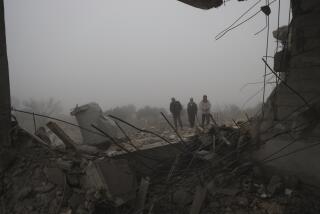Iraq Again Harassing U.N. Weapons Inspectors, Security Council Is Told
- Share via
UNITED NATIONS — The Iraqi government has mounted a new campaign of harassment against U.N weapons inspectors monitoring the nation’s arms industry, the Security Council was told Friday.
The harassment, which in at least one case involved an attempt by an Iraqi passenger to wrest control of a U.N. helicopter from its pilot in mid-flight, is the latest development in a pattern of Iraqi noncooperation with the U.N. commission charged with dismantling the country’s ability to wage nuclear, chemical or biological warfare.
Rolf Ekeus, chairman of the commission, said the problem eased in the last two weeks after he complained to Iraqi Deputy Prime Minister Tarik Aziz, but he and other commission insiders are concerned that the harassment will resume, given Iraq’s past practices.
The veteran diplomat, who is expected to step down from the commission later this year to become Sweden’s ambassador to Washington, made his semiannual report to the Security Council on Friday.
In it, he recounted the commission’s efforts to penetrate Iraq’s “policy of systematic concealment, denial and masking of the most important aspects of its proscribed weapons . . . capabilities.”
*
At the closed-door meeting, Ekeus confirmed reports earlier this year that Iraq apparently retains some mid-range missiles and the ability to arm them with chemical and biological warheads, according to one official present.
The commission was established by the cease-fire ending the 1991 Persian Gulf War to oversee the destruction of Iraq’s weapons of mass destruction and to set up a monitoring program to make sure the Iraqis make no replacement weapons.
That monitoring program now includes periodic inspections of more than 300 sites in Iraq that could be used to manufacture conventional, chemical and biological weapons, including petrochemical plants, pesticide factories, university laboratories and even breweries.
In the past six months, U.N. monitors have been denied access to some sites, refused information and advised not to fly over certain areas in commission aircraft. In one instance, an Iraqi helicopter bore down on one of the commission’s choppers, forcing it out of its flight path. In another, an Iraqi official aboard a commission helicopter tried to seize the controls from the Chilean pilot.
*
A senior U.S. official Friday characterized Iraq’s actions as “backward steps away from cooperation.”
But although the Security Council expressed concern about Iraqi noncooperation, representatives of Russia, France and Egypt also asked Ekeus to return with a specific list of what Iraq needs to do to fully comply with the cease-fire terms. Economic sanctions against Iraq cannot be lifted until the commission is satisfied that it has eliminated its nuclear, biological and chemical warfare capabilities.
Ekeus shrugged off the implied criticism in remarks to reporters afterward.
“Iraq is capable of answering all the questions,” he said. “There is nothing that is impossible to carry out. Everything is squarely in the hands of the Iraqi leadership.”
Few diplomats here believe that there is much chance that the Security Council will lift sanctions against Iraq in the near future. The comments by the Russian, French and Egyptian ambassadors Friday reflected a growing disenchantment among many nations with what one council member called the “blunt instrument” of economic sanctions.
Russia and France are known to be eager to resume business with Iraq, which owes sizable debts to both countries.
Disenchantment was also evident earlier in the week when U.S. Ambassador Bill Richardson could not rally the support of the full council behind a tough resolution condemning Iraq for violating the sanctions by flying a planeload of Iraqi Muslims to Mecca in Saudi Arabia for the annual Islamic pilgrimage there.
*
Commercial flights out of the country by Iraqi aircraft are banned by the sanctions. The council issued a mildly worded statement noting the violation.
More to Read
Sign up for Essential California
The most important California stories and recommendations in your inbox every morning.
You may occasionally receive promotional content from the Los Angeles Times.













